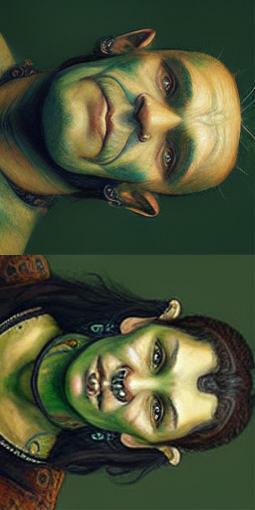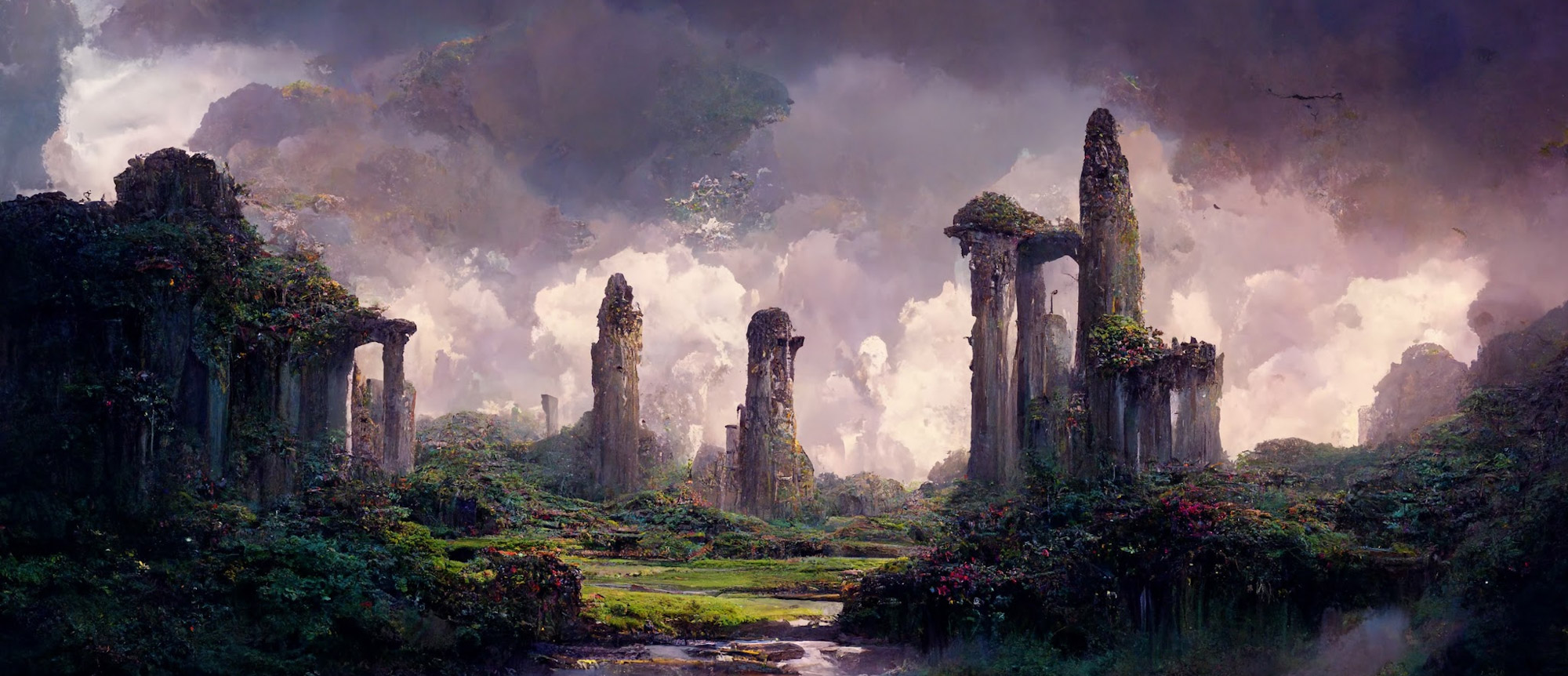Feloran Orcish Tribes
The Feloran Orcish Tribes, also known as the Southern Orcs, are an Orcish people native to the continent of Felora. It is not known how long Orcish peoples have been living on the Feloran continent, however the historical canon of the Empire of Felora contains references to Orcish peoples as far back as -4484 EIE, less than 200 years after the beginning of the written record. Orcs residing in Felora are descended from these ancient peoples, and although practically nothing is known of what their culture was like before the Empire, much of their clan names were retained. Southern Orcish identity as distinct from Feloran culture dates back to the years between the Kaelbryn Restoration and The Drowning of Antiokus , as Orc communities re-asserted their independence in the wake of the collapse of Imperial control over their lands.
Today, the various Southern Orcs live mostly in towns and villages on the peripheries of what remains of Feloran society, sustaining themselves through a mixture of fishing and trade (or piracy) on the Tealastrian. In the eastern Dotharan Coast, the esoteric D'jo have formed a tribal confederacy out of the surrounding settlements, while in the west the Northwestern Tribes have coalesced around the Warriors of Thröm, who lead a pirate confederacy from their hidden encampments along the coast. The majority of Feloran Orcs are not firmly part of either confederation, with the next largest group living in the Dotharic Orc Polity, although they are unique for being made up of mostly clanless half-orcs more attached to their non-Orcish heritages.
Naming Traditions
Feminine names
Feminine surnames tend to end in -ay and -ä suffixes. Less common are -oy and -ö suffixes. Common feminine names include:
- Klätay /ˈklɑteɪ̯/
- Klǔkotay /klʊˈkoteɪ̯/
- Äkä /ˈɑkɑ/
- Tǔnö /tʊnö/
Masculine names
Masculine surnames tend to end in -ayn and -än suffixes. Less common are -on and -un suffixes. Common masculine names include:
- Mhätayn /ˈmhɑteɪ̯n/
- Tayk /teɪ̯kɑn/
- Cäd'jon /Cɑʤon/
- Zed'jun /ˈzeʤun/
Unisex names
Several names are common to any gender. There is no uniform suffix pattern. Common examples names include:
- Åto /a'to/
- Klǎok /ˈklɑok/
- Mhurren /'mhʊrɛn/
- Zar̀ap /ˈzaɹap/
Family names
Most Southern Orcs have two family names: a clan name signifying their bloodline, and a tribal name. The clan name is the primary of the two, with only notable individuals using their tribal name in every parlance. Most clan names are title-based, bestowed upon a notable ancestor or claimed through prestige. Common clan names include:
- Ashar
- Erdur
- Grake-to
- Grum-to
- K'La
- Majop
- Ralek
- Zak.
Other names
In some communities of Southern Orcs, especially those with mixed heritage with Feloran Elves, Feloran surnames are commonly used.
- See: Feloran Language
Culture
Major language groups and dialects
Djonan is the sole major surviving indigenous Orcish language spoken by the tribes of Felora, originally native to the D'jo clans. Grilkar Chief Äko made a point of speaking it to his clan, who popularised it amongst the Warriors of Thröm. After the collapse of the Feloran Empire , its use became dominant in Orcish communities living near or in the successor states. Dialects further from the ancient borders of the Feloran Empire diverge quite significantly from Djonan, and many are not mutually intelligible. Many settlements near Feloran Successor States also speak Feloran, and many of the coastal dwelling tribes are fluent in trade common.
Shared customary codes and values
A fiercely independent people, Feloran Orcs share an affinity for personal liberty and strength, though in what way it manifests vary. The Warriors of Thröm are the most extreme - individuals hold almost no regard for their actions and reject any authority that can't forcibly subdue them. The Elders of D'jo on the other hand, preach that freedom is only worthy for those who understand the responsibility and sacredness of it. Though clan-based, most families within a clan are not related by immediate bloodlines, with membership dependent of one of their parents until adulthood, at which point, one is free to join other clans, subject to each clan's unique customs.
Average technological level
The coastal tribes are quite proficient sailors, with many individuals taking up professions as the captain of independent merchant vessels. The D'jo are the only tribe with an indigenous writing system, although cultural values restrict it's use. Most Feloran Orcs live as lightly settled, hunter-gatherers. The Orc Polity in the Dotharan Alliance is the notable exception, with complex engineering and high technology.
Common Etiquette rules
Feloran Orcs place a strong emphasis on presentation, and will present their strongest, most honest selves. A Feloran Orc will often introduce themselves with a statement of a recent accomplishment in addition to their name and home. A promise between two Feloran Orcs is considered unbreakable, and doing so can lead to generational feuds between tribes and clans. It is common for Feloran Orcs to be shouting at each other and interrupting each other, as it is considered to indicate excitement and interest in the conversation.
Common Dress code
The Dj'o favour lightweight and loose-fitting clothing made of linen, with leather or scales decorating some jackets and coats. The Warriors of Thröm often do not wear shirts, and instead adorn their chests with trophy necklaces. Most Feloran Orcs have facial piercings and jewelry around their necks, often made of shells or gemstones.
Art & Architecture
Feloran Orcs carry a rich oral tradition, having no written language of their own. Much of the poetry is unique for naming every character in the poem at its start, even if they're minor characters. This ensures respect for the person's in the story. Music of the tribes is made with various traditional wind instruments and/or scavenged instruments from Tealastrian ships.
They tend to build modest homesteads and halls out of the bountiful rainforest wood and mud brick. A few chieftains have imported ironworked materials from Aeilla and Cyrenica, as well as some of the wealthier merchant captains for their ships.
Common Customs, traditions and rituals
Southern Orcish custom is centered around the extended family, or clan, and is deeply spiritual. Communal storytelling is the bedrock of Feloran Orc cultural traditions, from major festivals to honor their ancestral gods or mythic heros to everyday stories around the dinner's campfire.
Birth & Baptismal Rites
When a child is born, the chieftain of the child's clan grants them an honorary title for their childhood, to be shed upon their first victory. This is often based on their family relation, status within the clan, and culture of the tribe. Though the Elders of D'jo have condemned the practice, in some of the fringe clans it is still common for a newborn that is sickly to be drowned or abandoned. It is now encouraged to bring the child to the D'jo Elders for care, who often turn them over to the Dotharic Orc Polity.
Coming of Age Rites
Adulthood begins for the Feloran Orc when they achieve their first victory in life, judged by their clan's eldest. Common victories include their first successful hunt, raid, or learning how to sail, fire a bow, or other life skill.
Funerary and Memorial customs
If the death was honorable (including old age), a Feloran Orc is buried on a designated sacred site as part of their tribe or clan's homestead, and their prized possessions placed on display in a public room, trophies to become part of the clan's legacy. If the death was not honorable, such as if they were killed as part of a deception or of illness.
Common Taboos
Lying to one's own clan is a major taboo for most tribes. Furthermore, cowardice in the face of an adversary is unnacceptable, with physical violence being seen as preferable in many cases. That said, unprovoked violence is equally scorned, viewed as the act of a weak will in all but the fringest of tribes.
Ideals
Beauty Ideals
Having dark brown eyes is considered a desirable trait in a prospective partner. The strong ears and a big nose are considered attractive, and to show this, piercings are more common than not in Southern Orcish culture. Necklaces with more trophies on them also increase a person's attractiveness in the eyes of many a clan, indicating their physical or mental prowess.
Gender Ideals
Feloran Orcs value strength in all genders. Feminine qualities in most clans include wisdom, inquisitiveness, and compassion. Masculine qualities in most clans include assertiveness, tactical intellect, and directness. Some clans are more rigid than others, enforcing stricter or more limited ideals on each of their genders, however leadership and toughness is a quality valued in all Feloran Orcs.
Courtship Ideals
A prospective partner is often approached with poetry by their would-be partner, detailing their exploits and vanquished foes, in an attempt to demonstrate their strength and suitability. If reciprocated, the approached partner will respond with one of several common short "mini" poems, part of the cultural lexicon of Southern Orcs and commonly understood to be an invitation to continue courtship.
Relationship Ideals
Feloran Orcs want a partner they can depend on to protect their kin, clan, and home with life and limb. Their platonic ideal of a romantic relationship is to strengthen the two (or more) parties involved, and partners are expected to strive to help the other. An insult against one partner is treated as an insult to both.
Major organizations
The two most promiment Southern Orcish groups are the D'jo and Warriors of Throm. However, most Feloran Orcs live in isolated communities made up of individual clans within a single tribal affiliation. An exact number of Feloran Orcish tribes is not known, however there are nine major tribal heritages: Cocra, Grilkar, Hiptar, Hurlog, Frumsh, Shobob, Tarbash, Urlocc, and Urnot, which are represented by their various clans across Felora and in the two prominent groups.

Southern Orcs by Trekman10
Parent ethnicities
Encompassed species
Related Organizations
Related Myths
Languages spoken
Related Locations


